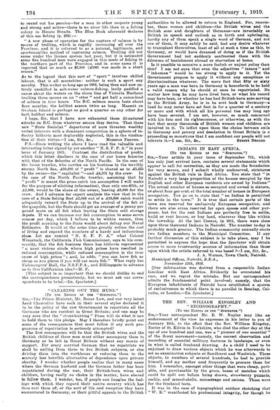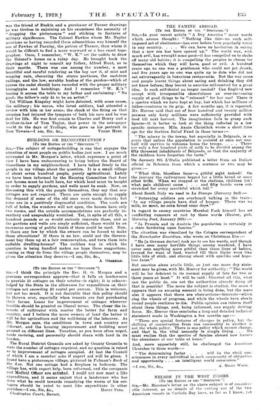THE REV. WILLIAM KINGSLEY AND " RECONOGRAPHY."
(To THE Emma or ma "SIXOTATOIL"l Sta,—Your correspondent Mr. E. W. Naylor may like an endorsement of the view he expresses in his letter to you of January leth, to the effect that the Rev. William Kingsley, Rector of St. Kilvin in Yorkshire, who died the other day at the age of one hundred and one, was a " pioneer of one essential " of the Scout movement—namely, the correct observation and recording of essential military features in landscape, or even in what is called freehand drawing. As a child I used to he enjoined to draw various objects which he was afterwards to set as examination subjects at Sandhurst and Woolwich. These objects, in numbers of several hundreds, he had to provide himself, and my mother used frequently to procure them for him. I remember, amongst other things that were cheap, port- able, and purchasable by the gross, boxes of matches which could be spilt out before being drawn, strawberry punnets, cockle. and mussel-shone, mousetraps and onions. These were for the freehand tests.
It was in the case of topographical outdoor sketching that "W. K." manifested his professional integrity, for though he
was the friend of Ruskin and a purchaser of Turner drawings he was tireless in enjoining on his examinees the necessity of "dropping the picturesque" and sticking to features of military significance. The Colonel Fawkes whom Mr. Naylor mentions as having recorded these admonitions was himself the son of Fawkes of Fernley, the patron of Turner, than whom it would be difficult to find a more wayward or a less exact topo- grapher. Once, I remember, " W. X." set the cadets to draw the Colonel's house on a rainy day. He brought back the drawings at night to consult my father, Alfred Hunt, as to their merits. There was one among the number, a most beautiful and careful rendering as the boy saw it, of mist and weeping rain, obscuring the stucco porticoes, the cast-iron railings, and the low, scrubby bushels of the garden—which of course the cadet should have recorded with the proper military hieroglyphs and hatchings. And I remember " W. K.'s " tossing it across the table to my father and exclaiming: "No good; the fellow's only fit to be an artist."
Yet William Kingsley might have eleteeted, with some cause, the military: his nurse, who loved soldiers, had attended a review with him in her arms; the shook of the firing on that occasion had injured the tympana of both his ears and he wee deaf for life. He was first cousin to Charles and Henry and a brother-in-law of Tom Taylor, that power in the newspaper world in the days of Trollope, who gave us his portrait in



































 Previous page
Previous page